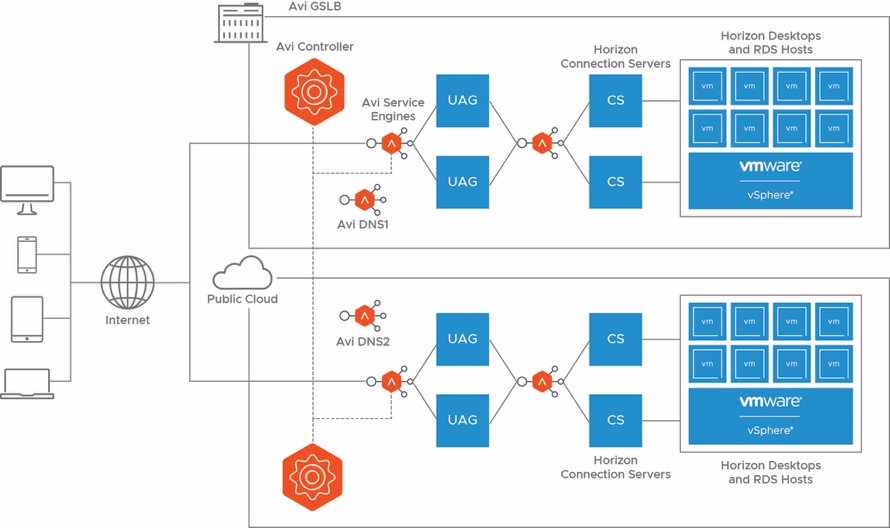Modern load balancing for VMware Horizon
CHALLENGES
- Hardware load balancers are over-provisioned and lack flexibility for modern VDI deployments
- Appliance-based, monolithic architectures for load balancing cause operational complexity
- Troubleshooting end user experience and application issues is very difficult without visibility and analytics
SOLUTION
- VMware's own enterprise-grade load balancer by Avi Networks delivers software-defined load balancing for VMware Horizon in any data center or cloud (NSX not needed).
- The Avi Controller (control plane) is a central point of configuration and management of all load balancing resources.
- Load balancing capacity is autoscaled dynamically based on traffic volumes
- Avi App Insights provides end-to-end traffic intelligence, recording and replaying of network incidents, and end-user insights – both historical and real time
BENEFITS
- Deliver superior VDI experiences quickly while reducing network infrastructure required.
- Dynamic, on-demand autoscaling seamlessly scales to deliver virtual desktops and apps in any data center or cloud.
- Pinpoint analytics and end-user insights simplifies troubleshooting and resolution of VDI issues.
LOAD BALANCING CHALLENGES FOR VMWARE HORIZON
Enterprises choose VMware Horizon - a leading VDI solution, to deliver seamless virtual desktops and apps on-premises and in the cloud. Horizon delivers desktops and applications through a single platform with the ability to consolidate security and policies for end user compute resources. Enterprise-grade, high-performance load balancing is a necessity in VDI environments to deliver great end user experiences. With the shift towards software-defined data centers and cloud delivery models, the architectural limitations have caused traditional appliance-based load balancers (either as hardware or virtual appliances) to become inflexible and expensive. They slow down application rollouts, cause overprovisioning, increase operational costs, and lack the comprehensive visibility into the end-user experience and application performance needed to support these applications. Enterprises modernizing their data centers or migrating to clouds are making the shift to dynamic, multi-cloud load balancing for VDI environments. The support of a per desktop user model allows IT teams to easily consume load balancing for virtual desktops and right size their deployments.
AVI NETWORKS – VMWARE’S PREFERRED LOAD BALANCER FOR HORIZON
With the acquisition of Avi Networks the leading software-defined load balancing platform, VMware has entered the Application Delivery Controller (ADC) market. VMware now offers enterprise-grade load balancing, web application firewall and many other application services for VMware environments as well as other multi-cloud environments. The Avi Networks load balancer is built on a software-defined architecture delivering the flexibility and operational simplicity expected by IT and lines of business. Unlike legacy, appliance-based load balancers or virtual load balancers, which are architecturally constrained, Avi separates the data and control planes to deliver load balancing as a dynamic pool of resources that is centrally managed. The platform delivers an unprecedented level of automation and application insights to simplify VDI deployments and troubleshooting of end user experience issues.
Avi Networks uses a software-defined scale-out architecture that is 100% based on REST-APIs. It delivers high-performance application services including load balancing, application security and container ingress load balancing on one consistent, multi-cloud platform. The platform provides elastic autoscaling, built-in application and end-user analytics, and full life-cycle automation of load balancers.

FIGURE 1: Avi Networks Integration with VMware Horizon
Advantages of Avi Networks for VMware Horizon
Avi Networks disrupted the market for application delivery and load balancing in modern data centers and multi-cloud environments. The Avi platform now called VMware NSX Advanced Load Balancer works in both VMware NSX as well as standalone environments. Enterprises such as Adobe and Deutsche Bank have deployed the solution to deliver their applications to meet demanding SLA requirements.

FIGURE 2: Avi Networks - Modern, Multi-Cloud Load Balancing and WAF
VMware’s preferred load balancing solution for Horizon:
Avi Networks is VMware’s preferred, multi-cloud load balancer for Horizon and has replaced legacy appliance-based load balancers to deliver VMware IT’s VDI infrastructure. As a result of deploying Avi, the VMware IT team has already seen significant cost and operational improvements.
“We were under pressure to rollout Horizon VDI to very large number of newly acquired employees quickly. Avi helped us accomplish this in just a few days, instead of the weeks that it would have taken with legacy solutions. Avi’s application insights and health scores help us proactively address any end-user experience issues or other application issues.”
Swapnil Hendre, Director of Solutions Engineering and Design for VMware IT
Consistent multi-cloud capabilities
As a software-defined platform with separate control and data planes, Avi is not constrained by hardware or by the underlying operating environment. The platform delivers a consistent set of features across private data centers or public cloud platforms such as Amazon AWS, Microsoft Azure, Google Cloud Platform, or IBM Cloud.
Simplified operations and fast deployments
Horizon VDI is designed to quickly deliver secure virtual desktops and applications to end users while eliminating the need to deploy desktop infrastructure to remote users. Yet, when it comes to delivering VDI environments, enterprises have had to rely on inflexible, expensive hardware load balancers. Unlike legacy appliance-based load balancers which require several manual steps, costly overprovisioning, and cumbersome individual instance maintenance, Avi can be provisioning in just minutes and dynamically scaled to support the necessary volume of VDI transactions.
Built-in application insights ease troubleshooting
The unique architecture of the Avi platform enables the Avi Controller to collect and analyze millions of bits of real time telemetry from the Avi Service Engines (in the data plane). As a result, the platform includes pinpoint application performance, security, and end-user insights which are presented in an intuitive dashboard to enable administrators to troubleshoot any issues quickly. This eliminates the need for cumbersome TCP dumps, log exports and other third-party tools to debug application issues.
Central control instead of managing individual instances
Traditional ADCs require administrators to deploy, configure, and manage individual load balancers. The Avi Controller on the other hand is a central controller that can be deployed on-premises or in the cloud and manages the entire lifecycle of the load balancers. The model simplifies network operations and enables administrators to focus on their applications instead of the infrastructure.
High-performance SSL offloading and re-encryption
The elastic scale-out architecture of the Avi platform enables it to offload a large number of SSL transactions per second. The platform has been benchmarked at over 1 million SSL transactions per second. The platform supports both RSA 2K and the newer ECC (Elliptic Curve Cryptography) and also includes support for Perfect Forward Secrecy (PFS).
Web application firewall, DDoS Mitigation, and GSLB
The Avi platform includes the full suite of application security capabilities including application rate limiting, URL filtering, DDoS protection, and an intelligent web application firewall (iWAF). The Avi iWAF solution simplifies web application security and reduces false positives. The platform also includes global server load balancing (GSLB) capabilities to support multi-site deployments.
Cost effective solution with flexible licensing
Without the need to overprovision infrastructure to account for the worst-case scenario, enterprises save significant costs when rolling out VDI with Avi. The on-demand elasticity that Avi offers means that load balancers can scale dynamically based on real time traffic patterns. Avi supports a per desktop user model based on concurrent user (CCU) counts of 10, 100, 1,000, and 5,000. Horizontal and vertical scaling can be done either by deploying a few large capacity load balancers or deploying many smaller capacity load balancers. On average enterprises save nearly 50% over the cost of traditional hardware-based ADCs.
More Information:
http://avinetworks.com/vmware-horizon
